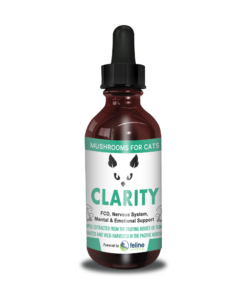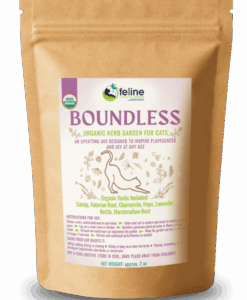Inflammatory Bowel Disease (IBD) in cats is nothing to take lightly. IBD is one of the most common causes of long-term digestive problems in felines. While IBD may be triggered by food sensitivities, immune system dysfunction, or environmental stress, other chronic digestive issues can present similar symptoms.
No matter the cause, feeding the right diet is essential for healing and comfort. In this article, we’ll share how to nourish cats dealing with IBD—or any ongoing digestive distress.
Feeding Cats with Chronic Digestive Issues
First and foremost, work with an integrative or holistic veterinarian or nutritionist to create a custom feeding plan. Every cat is different, and a professional can help you figure out the best approach based on your kitty’s history, symptoms, and sensitivities.
That said, there are a few foundational tips that apply to most cats with gastrointestinal challenges:
➡ Stick to a bland diet during flare-ups. A bland diet of 50/50 cooked ground turkey with pure pumpkin is one of the easiest combinations on a cat’s stomach. Avoid beef and rice—beef is often too fatty, and rice can aggravate sensitive guts. Pumpkin helps soothe the digestive tract and adds a gentle source of fiber. Sweet potato can be substituted for pumpkin if your cat prefers it.
➡ Offer bone broth for healthy hydration. Bone broth can be settling to the tummy while offering vital nutrients. Only give pet-safe bone broth – no onion or salt added.
➡ Limit ingredients and avoid common irritants. Look for single-protein meals without fillers, artificial additives, or grains. Simpler is better when your cat’s gut is struggling to stay balanced.
➡ Try a novel protein diet once your cat stabilizes. Introducing a protein your cat hasn’t eaten before (like rabbit, duck, or venison) can give the digestive system a break and help it heal quicker.
➡ Keep meals moisture-rich. Feeding a fresh, lightly cooked or raw diet can help support digestion and overall gut health. Dry food tends to worsen digestive issues, especially in cats with chronic inflammation.
The Power of Targeted Supplements
No matter the cause of your cat’s digestive discomfort, the right supplements can go a long way in providing relief. Probiotics help restore balance to the microbiome, while digestive enzymes assist in breaking down food more efficiently. Natural anti-inflammatory supplements can also help soothe the GI tract and promote healing.
From personal experience, we’ve seen how important these additions are—especially for cats dealing with IBD or ongoing tummy troubles. If possible, avoid chemical medications that will treat symptoms but can worsen the problem. Addressing gut health holistically is one of the best ways to help your kitty live a longer, happier life.




Recent Comments